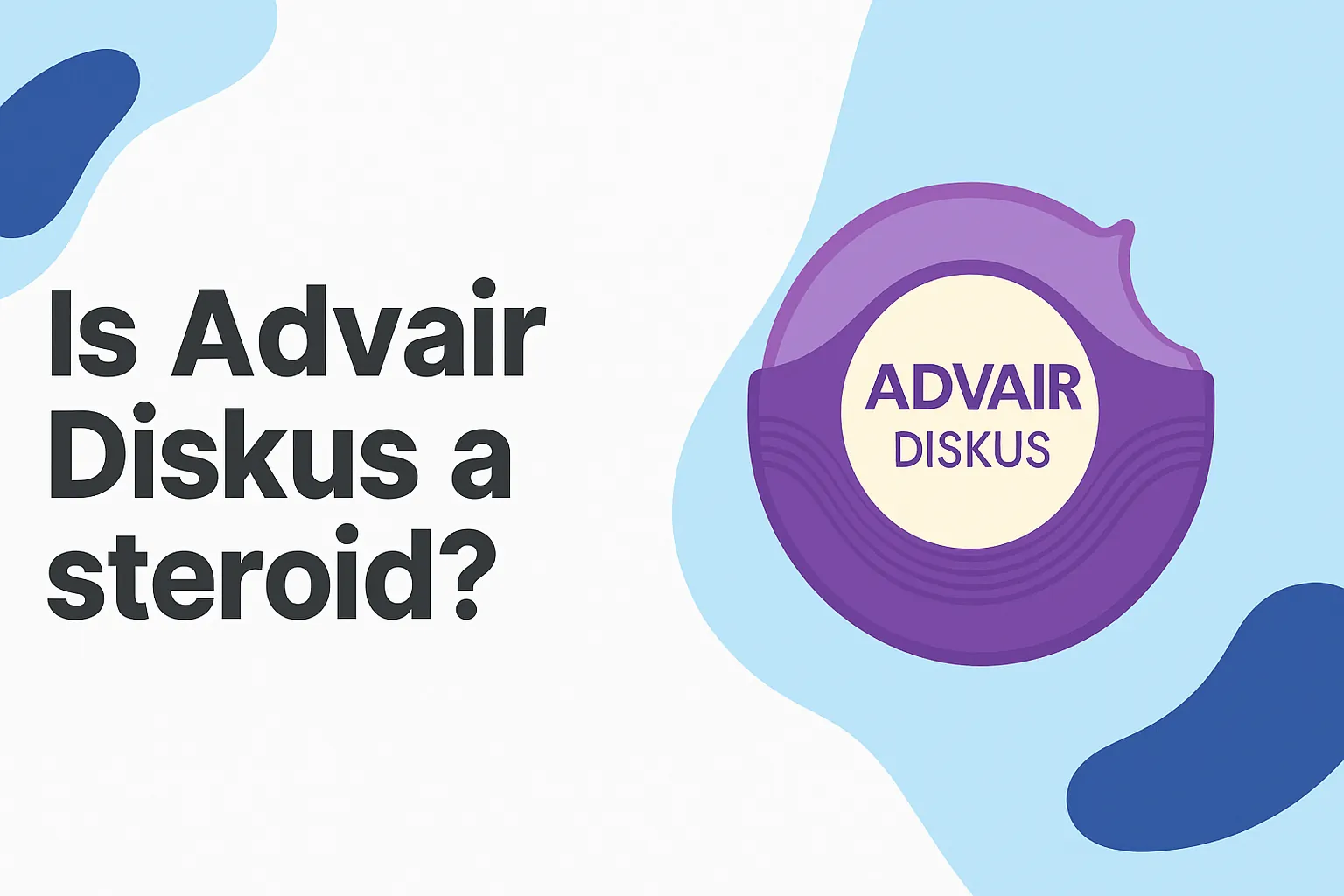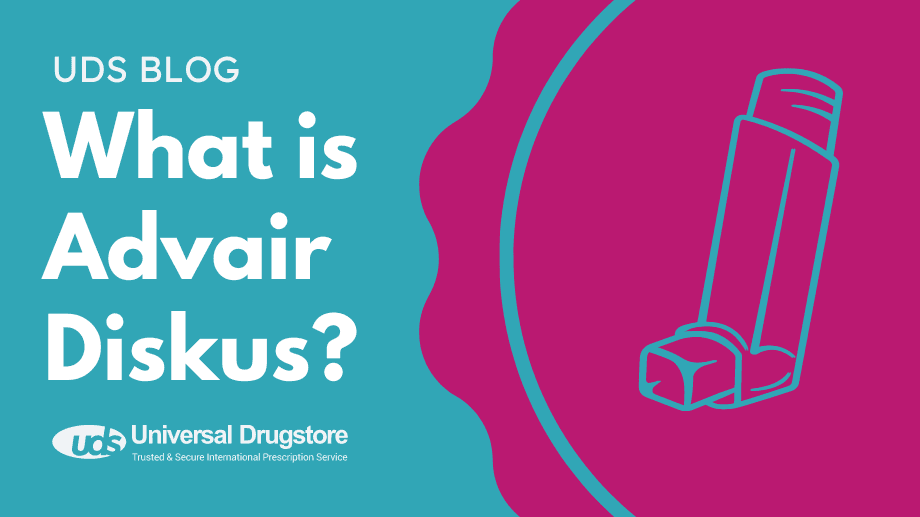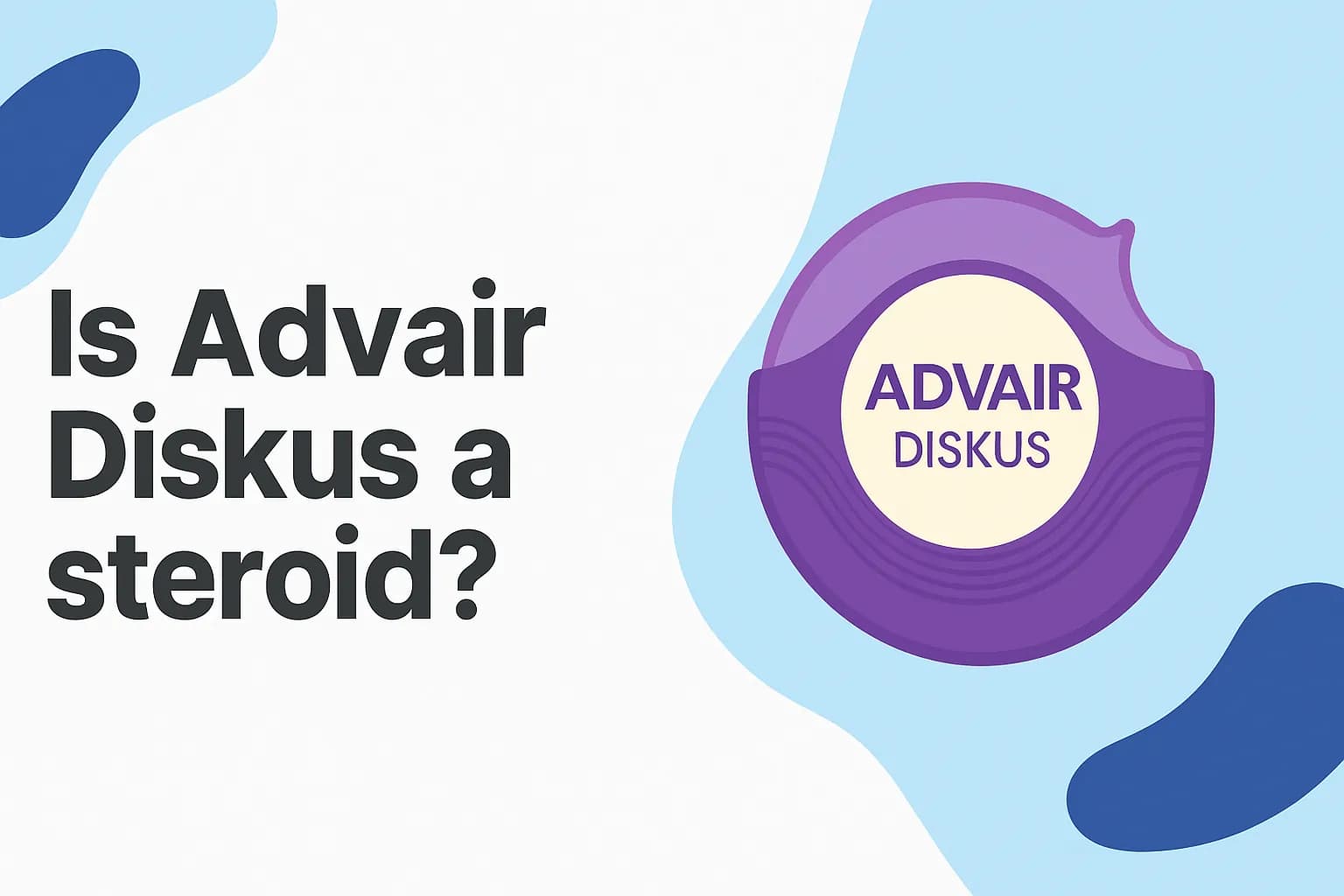Is Advair Diskus a steroid?

Yes, Advair Diskus (fluticasone/salmeterol) contains a steroid called fluticasone propionate. Steroids work by decreasing inflammation and reducing the activity of your immune system. Inflammation is a process in which your body’s white blood cells and chemicals can protect against infection and foreign substances such as allergens, viruses, and bacteria. Steroids slow down the production of chemicals that cause inflammation. This helps keep tissue damage as low as possible and helps reduce swelling so that you can breathe easier. Some other examples of inhaled corticosteroids include Pulmicort Flexihaler (budesonide), Asmanex Twisthaler (mometasone), Flovent Diskus (fluticasone propionate), and Qvar (beclomethasone).
The other active ingredient, salmeterol, is a long-acting beta-agonist (LABA). The main action of LABAs is to relax the muscles in your lungs by stimulating beta 2-adrenergic receptors. The resulting bronchodilation helps open up your airways so that you can breathe better. Some other examples of LABAs include Serevent (salmeterol), Foradil (formoterol), Perforomist (formoterol), and Striverdi Respimat (olodaterol).
Read on as we will discuss Advair Diskus’s common and serious side effects, what it is used for, potential drug interactions, and answer other frequently asked questions.
Advair Diskus FAQs
What is Advair Diskus used to treat?
Advair Diskus is a brand-name fluticasone propionate and salmeterol inhalation powder that is approved by the U.S. Food and Drug Administration (FDA) for the treatment of asthma symptoms in patients 4 years of age and older. It is also used in the maintenance treatment of chronic obstructive pulmonary disease (COPD), which includes chronic bronchitis and emphysema.
Advair Diskus is not approved to treat acute bronchospasms (asthma attacks) and will not replace your short-acting rescue inhaler such as Ventolin HFA (albuterol).
What does Advair Diskus do to your lungs?
Advair Diskus contains two different active ingredients: fluticasone propionate and salmeterol.
Fluticasone propionate is an inhaled corticosteroid (ICS). The exact way that it works to treat asthma is not well understood. It is thought to work directly in your lungs to reduce swelling and inflammation, making it easier for you to breathe.
Salmeterol is a long-acting beta-agonist (LABA). It is a bronchodilator that works by relaxing the muscles in your lungs to open up your airways, making it easier to breathe.
What dosage forms are Advair Diskus available in?
This medication is available as an oral inhalation powder in the following strengths:
- Advair Diskus 100 mcg/50 mcg
- Advair Diskus 250 mcg/50 mcg
- Advair Diskus 500 mcg/50 mcg
All strengths of Advair Diskus should be stored at room temperature between 68°F and 77°F (20°C and 25°C) with the mouthpiece down.
How often should Advair Diskus be used for asthma or COPD treatment?
Advair Diskus comes in 3 different strengths. Your healthcare provider will prescribe the strength that is right for you. It is important to follow your healthcare provider’s instructions on how to use Advair Diskus correctly. The recommended dosage is 1 inhalation twice a day. It should be used around the same time every day, about 12 hours apart.
What are the side effects of Advair Diskus?
While Advair Diskus is generally well-tolerated, like any medication, it can cause side effects. The most common side effects of Advair Diskus seen in clinical trials include:
- Upper respiratory tract infections such as the common cold or sinus infections
- Sore throat
- Headache
- Bronchitis
- Cough
- Nausea and vomiting
- Throat irritation and hoarseness
Other side effects seen with Advair Diskus include:
- Dizziness
- Oral thrush (fungal infection that causes sores or white patches in your mouth or throat)
- Stomach pain or discomfort
- Diarrhea
- Muscle pain
While less common, some individuals may experience serious side effects while using Advair Diskus. These side effects may require immediate medical attention. If you experience any of the following, contact your healthcare provider or seek emergency medical assistance:
Serious allergic reactions, which can be life-threatening. Symptoms can include:
- Hives
- Shortness of breath
- Swelling of the mouth, throat, and tongue
Acute bronchospasm.
Medications like Advair Diskus can sometimes cause muscle spasms in your lungs which can lead to trouble breathing, wheezing, cough, and chest pain or discomfort.
If you have worsening breathing problems after using Advair Diskus, use your rescue inhaler and get medical attention immediately. Be sure to let your healthcare provider know if you are using your rescue inhaler more often than usual, if it doesn’t relieve your symptoms, or if your peak flow meter results are decreased.
Increased risk of infections.
Advair Diskus contains an inhaled corticosteroid (fluticasone), which can weaken your immune system and make you more likely to get an infection.
Notify your healthcare provider right away if you develop symptoms of infections, such as fever, chills, or body aches.
Shop Medications
Changes in your stress hormone levels.
This can happen when you stop taking an oral corticosteroid medication (prednisone) and start taking Advair Diskus.
Let your healthcare provider know if you experience fatigue, nausea and vomiting, lack of energy, low blood pressure (hypotension), or weakness.
Delayed growth in children.
Children who use inhaled steroids, like Advair Diskus, might experience a delay in growth. To lower this risk, your child’s healthcare provider will use the lowest dose needed to help treat their condition. You should also check your child’s growth regularly while they’re receiving this medication.
Eye problems.
Although rare, the long-term use of Advair Diskus may cause higher pressure in their eyes, cataracts, and glaucoma. Contact your healthcare provider if you notice any changes to your vision while using this medication.
Heart problems.
The long-acting beta-agonist, salmeterol, can cause high blood pressure, increased heart rate, and an irregular heartbeat.
You may need to regularly check your blood pressure and heart rate at home if you have heart problems. Do not use Advair Diskus more than prescribed. Tell your healthcare provider if you have tremors, dizziness, rapid heartbeat, fatigue, or weakness after you start this medication.
Low potassium levels.
This medication can cause the potassium levels in your blood to decrease, especially if you use more than recommended. The change in your potassium is usually mild and temporary. Let your healthcare provider know if you have any tiredness, weakness, muscle cramps, a racing heart, or a “pins and needles” feeling in your hands and feet.
Weakened bones and osteoporosis.
These are not all of the possible side effects of Advair Diskus. You should always seek medical advice from your healthcare provider for any questions or concerns about your medical condition or treatment. Read all patient information, medication guides, or drug information sheets that come with this medication. You can also report adverse effects to the FDA at www.fda.gov/medwatch or 1-800-FDA-1088.
What drugs interact with Advair Diskus?
Advair Diskus may interact with other medications, supplements, or foods, potentially affecting its effectiveness or increasing the risk of side effects. It is important to inform your healthcare professional about all the medications, including prescription drugs, over-the-counter medications, vitamins, and supplements you are taking, including:
- Strong CYP3A4 inhibitors such as ritonavir and ketoconazole should not be used with Advair Diskus.
- Tricyclic antidepressants (amitriptyline) and monoamine oxidase inhibitors (phenelzine) should be used with extreme caution.
- Beta-blockers (atenolol) and diuretics (furosemide) should be used with caution while on this medication.
Who should not take Advair Diskus?
Advair Diskus is contraindicated if you have a known allergy to fluticasone, salmeterol, milk proteins, or any other inactive ingredients in this product.
You should also make sure your healthcare provider is aware of your medical conditions before you start taking Advair Diskus, including:
- Heart problems such as high blood pressure or irregular heartbeat
- Seizures
- Thyroid issues
- Diabetes
- Liver issues
- Osteoporosis
- Immune system issues
- Current or history of eye problems such as cataracts, glaucoma, or increased pressure in your eye
- Any type of bacterial, fungal, or viral such as herpes or tuberculosis
- Exposure to measles or chickenpox
- Taking antifungals or medications for HIV
- Pregnant or plan on becoming pregnant; it is not known if the medications in Advair Diskus will cause harm to your unborn baby
- Are breastfeeding or plan to breastfeed; it is not known if the medications in Advair Diskus pass into breast milk and what effect they might have on your breastfed infant
Can Advair Diskus be used for acute asthma attacks?
Advair Diskus must be used regularly to be effective in preventing asthma attacks. It does not work right away and should not be used to relieve sudden breathing problems. For relief from an asthma attack that has already started, you should use a rescue inhaler. If you do not have a rescue inhaler, talk with your healthcare provider so they can prescribe one for you.
Do you gain weight on Advair Diskus?
In clinical studies, weight gain occurred in 1% to 3% of people who took Advair HFA. Weight gain has also occurred with Advair Diskus, but after the drug was approved for use. It is not known how many people have gained weight with Advair Diskus or if it caused it. If you are concerned about gaining weight while using Advair Diskus, talk with your healthcare provider.
Is Advair Diskus safe for long-term use?
If Advair Diskus works for you, your healthcare provider might suggest you stay on it for years. It is generally safe for long-term use, but as with all medications, it has potential risks. In children, using it for a long time may stunt their growth due to the steroid it contains. Your child’s growth should be monitored while on this medication.
Other rare but serious risks of long-term use include heart problems such as high blood pressure, glaucoma, cataracts, increased risk of infections, low potassium levels, and weakened bones.
Related medications
- Advair HFA (fluticasone propionate/salmeterol aerosol)
- Serevent (salmeterol)
- Flovent Diskus (fluticasone propionate)
- Dulera (mometasone/formoterol)
- Symbicort (budesonide/formoterol)
- Breo Ellipta (fluticasone furoate/vilanterol)
- Trelegy Ellipta (fluticasone furoate/umeclidinium/vilanterol)
Sources
- Medscape: https://reference.medscape.com/drug/advair-diskus-salmeterol-fluticasone-inhaled-343448
- Advair Diskus Prescribing Information: https://gskpro.com/content/dam/global/hcpportal/en_US/Prescribing_Information/Advair_Diskus/pdf/ADVAIR-DISKUS-PI-PIL-IFU.PDF
- PDR: https://www.pdr.net/drug-summary/?drugLabelId=166
- DailyMed: https://dailymed.nlm.nih.gov/dailymed/drugInfo.cfm?setid=4eeb5f6a-593f-4a9e-9692-adefa2caf8fc




